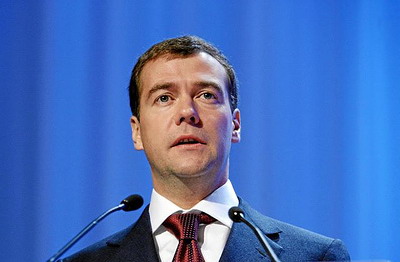
MEDVEDEV CONTINUES AND ESCALATES PUTIN’S HARD LINE ON GEORGIA
Publication: Eurasia Daily Monitor Volume: 5 Issue: 113
By:

The Kremlin not only uses every available opportunity but also creates opportunities to show disdain for the weakness of Western policies on Georgia. Following the European Union-United States June 10 summit declaration, supporting Georgia’s territorial integrity in fine-print words only, Russian President Dmitry Medvedev promptly awarded a high Russian state medal to the chairman of the “inter-parliamentary assembly” of Abkhazia, South Ossetia and Transnistria (Interfax, June 12). Headquartered in Moscow, that assembly propagandizes for international recognition of the secessionist authorities. Its chairman, Grigory Marakutsa (formerly the head of Transnistria’s Supreme Soviet) was pulled from obscurity into the limelight for a day, apparently to help demonstrate Medvedev’s estimation of Western resolve.
That symbolic gesture is also a fitting coda to Medvedev’s talks with Georgian President Mikheil Saakashvili in St. Petersburg, as well as to EU High Representative for the Common Foreign and Security Policy Javier Solana’s visit to Abkhazia, both on June 6. Developments in the aftermath of both events confirm the initial assessments: Those talks were necessary but proved futile. Their failure clears the way for the adoption of new approaches, removing any excuse for persisting with the 14-year-old ones.
Facing the rapidly advancing annexation of its territory, Georgia nevertheless tried hard to give Medvedev a chance to modify his predecessor Vladimir Putin’s policy on Abkhazia and toward Georgia generally. Saakashvili and other Georgian officials persistently spoke of turning a new page and stretching out the hand of friendship to Moscow. The Georgians reasserted their intention to refrain from using force; they even gave up the flights by their unmanned, unarmed drones in their own airspace over Abkhazia. Saakashvili declared, “There are no unsolvable issues between Georgia and Russia. Many issues are unresolved, but almost all can be resolved through mutual understanding.”
To give such a process a chance to develop, Saakashvili brought a limited set of goals to his get-acquainted meeting with Medvedev. The Georgian president sought: 1) prompt withdrawal of Russia’s supplementary “peacekeeping” troops, deployed to Abkhazia in late April and early May; 2) prompt cessation of construction activities by Russian “railroad troops,” deployed in late May and early June, and their withdrawal from Abkhazia; and 3) revocation or non-implementation of Russia’s April 16 presidential decree, which authorizes the Russian government to enter into official direct relations with Abkhaz and South Ossetian secessionist authorities.
In addition, the Georgians initiated discussions with Russia on a process of transforming Russia’s military “peacekeeping” operation into an international one, predominantly of a police character, and a political settlement involving Abkhaz autonomy within Georgia.
Medvedev rejected every one of those points. He described the deployment of supplementary troops as legitimate (ignoring Georgia’s legally-based diplomatic protests); the takeover and militarization of the railroad in Abkhazia as inspired by “humanitarian” considerations and not excluding “cooperation” with Georgia in that regard (as if not knowing that the railroad was Georgian state property); and confirmed in multiple ways that the April 16 decree was continually being implemented (while in many ways also legalizing the faits accomplis).
The Russian president asked Georgia to stay within the “existing” [i.e., Russian-controlled] formats for peacekeeping and negotiations, this being Moscow’s decade-old response to Georgian calls for internationalization. Medvedev also endorsed the Abkhaz authorities’ preconditions for a dialogue with Tbilisi, namely, withdrawal of Georgian “forces” from Upper Abkhazia (Kodori Valley) and the signing of a Georgia-Abkhazia agreement on non-use of force.
Tbilisi, however, only has a police unit equipped for keeping public order in Upper Abkhazia; and while Tbilisi would consider issuing a unilateral pledge of non-use of force, it cannot sign an agreement that would in effect recognize the secessionist authorities, particularly if Russia is to “guarantee” it with troops in place, which is Moscow’s goal behind this particular demand.
Moreover, as Russian Minister of Foreign Affairs Sergei Lavrov summed up, Medvedev threatened Georgia with “another cycle of confrontation” and “renewed bloodshed” in the conflict zones, if Georgia persisted in its aspirations to join NATO. The Russian government calls for “normalization” of Georgia-Russia relations. It does not specify what such normalization would entail, but it does make clear that it would only apply to the rest of Georgia, while Russia would retain control in Abkhazia and South Ossetia (Interfax, Itar-Tass, Civil Georgia, June 6 – 12).




